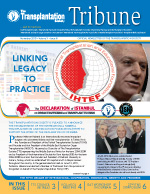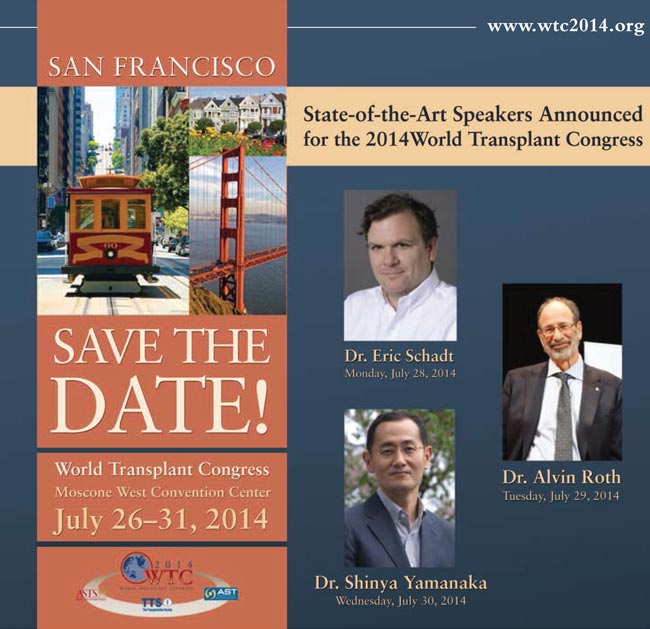Newsletter 2013 Volume 10 - Issue 3
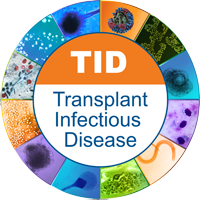 The Transplant Infectious Disease section recently wrapped up the 7th International Conference of the TID in Vienna, Austria in advance of the 2013 ESOT Congress. The meeting was well attended with over 130 participants from every geographic region of TTS represented. Scientific sessions highlighted the most recent developments in transplant infectious disease and the popular “Exciting Cases” portion of the program ended the day on a high note. The conference dinner was hosted at the historic Hotel Imperial, with its stunning architecture and beautiful frescos. The recordings of the scientific sessions are now available on the TID Members only section and can be found by visiting www.tts.org/tid.
The Transplant Infectious Disease section recently wrapped up the 7th International Conference of the TID in Vienna, Austria in advance of the 2013 ESOT Congress. The meeting was well attended with over 130 participants from every geographic region of TTS represented. Scientific sessions highlighted the most recent developments in transplant infectious disease and the popular “Exciting Cases” portion of the program ended the day on a high note. The conference dinner was hosted at the historic Hotel Imperial, with its stunning architecture and beautiful frescos. The recordings of the scientific sessions are now available on the TID Members only section and can be found by visiting www.tts.org/tid.
During the conference we also had the opportunity to thank Camille N. Kotton for her long-standing commitment to TID and thank her for her 6 years as President of the Section: thank you again Camille for your dedication and passion to this Section of TTS!
The conference in Vienna also provided a venue for the newly formed Council of TID to meet and begin goal setting and planning for the next two years. At the conclusion of the meeting, the Council determined the following priorities for the Infectious Disease section:
- Develop relationships with other infectious disease societies
- Initiate a webinar series focused on infectious disease
- Develop interactive elements on the TID website including a question forum
- Engage ID specialists in developing countries to encourage knowledge-sharing.
We look forward to offering these benefits and more to our membership in 2014.
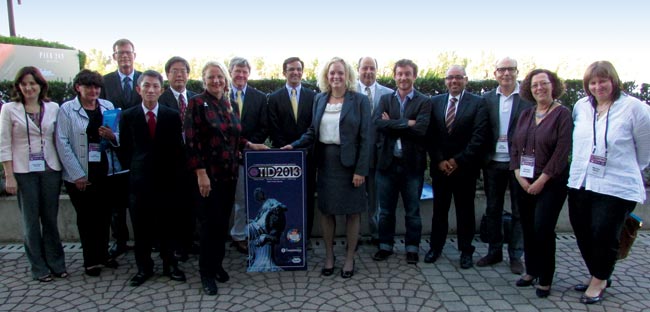
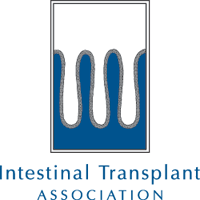 The 2013–2015 Intestinal Transplant Association Council is pleased to outline the Association’s agenda and highlight upcoming events.
The 2013–2015 Intestinal Transplant Association Council is pleased to outline the Association’s agenda and highlight upcoming events.
By all measures, the 13th ISBTS held in Oxford, UK in June 2013 was a huge success. The Symposium featured state of the art lectures as well as presentations of cutting edge basic and clinical science. It was well attended by registrants worldwide. The weather and social events were superb. The Council wishes to formally thank the Local Organizing Committee for an outstanding meeting.
Looking forward, Buenos Aires, Argentina is the selected site for the 14th ISBTS. The dates of this meeting will be August 26–29, 2015. As the Local Organizing Committee has been underway with preparations for nearly 2 years, we are anticipating one of the highest caliber symposia to date. This will represent a milestone of sorts for a number of reasons. First, it will be the first time that the ISBTS has been held outside of Europe or North America; and second, it will be the first time that the ITA is directly involved in all aspects of the symposium.
For the 15th ISBTS to be held in 2017, we have currently received letters of interest from 4 centers: New York, NY; Durham, NC; Cleveland, OH; and Nanjing, China. The ITA and TTS are currently vetting these letters and will move forward with site visits for the top candidates. Stay tuned for more developments.
The Council is also excited to report on the solidification of our ITA committees. These committees have been in various stages of development for several years. At the June 2013 Council meeting, the committees and their chairs were formalized:
- Scientific Committee: George Mazariegos (Chair)
- Membership Committee: Simon Horslen (Chair)
- Education & Regulation Committee: Kareem Abu-Elmagd (Chair)
- Allied Health Professionals Committee: Erin Fennelly (Chair)
We have developed goals and objectives for each committee and are in the process of appointing 4-5 committee members for each. If any ITA member in good standing wishes to participate in one of these committees, please contact the President or the ITA.
ITR data is ready! We anticipate posting on the web for ITA members to view this fall.
The ITA currently has 249 active members and is developing a membership drive to ensure that all interested members are represented in good standing.
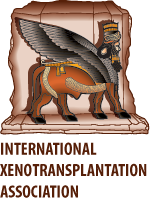 November is ending on a high note as we are coming back from the 12th Congress of the International Xenotransplantation Association (IXA), held in Osaka, Japan, from November 10–13, 2013. The joint program with the iABO/Hyper Immune Symposium provided an excellent forum for both clinical investigators and basic scientists with expertise in ABO-incompatible transplantation and xenotransplantation to meet and discuss innovative strategies for overcoming antibody-mediated rejection, organ shortage, and other obstacles. Plenary sessions highlighted most recent advances and challenges in the areas of presensitization, pre-clinical life-supporting xenotransplantation and islet xenotransplantation. In addition, an important consensus meeting was held to discuss regulatory affairs related to corneal xenotransplantation. Finally, many young investigators participated through oral and poster presentations, making this meeting a vibrant and productive platform for scientific exchange and discussion. We would like to thank all speakers and attendees for their wonderful participation in the meeting, and invite IXA members to access recorded lectures and presentations on the IXA website. We are looking forward to the next IXA Congress, to be held jointly with the International Pancreas and Islet Transplant Association (IPITA) and the Cell Transplant Society (CTS) in Melbourne, Australia, in Melbourne, Australia, in 2015.
November is ending on a high note as we are coming back from the 12th Congress of the International Xenotransplantation Association (IXA), held in Osaka, Japan, from November 10–13, 2013. The joint program with the iABO/Hyper Immune Symposium provided an excellent forum for both clinical investigators and basic scientists with expertise in ABO-incompatible transplantation and xenotransplantation to meet and discuss innovative strategies for overcoming antibody-mediated rejection, organ shortage, and other obstacles. Plenary sessions highlighted most recent advances and challenges in the areas of presensitization, pre-clinical life-supporting xenotransplantation and islet xenotransplantation. In addition, an important consensus meeting was held to discuss regulatory affairs related to corneal xenotransplantation. Finally, many young investigators participated through oral and poster presentations, making this meeting a vibrant and productive platform for scientific exchange and discussion. We would like to thank all speakers and attendees for their wonderful participation in the meeting, and invite IXA members to access recorded lectures and presentations on the IXA website. We are looking forward to the next IXA Congress, to be held jointly with the International Pancreas and Islet Transplant Association (IPITA) and the Cell Transplant Society (CTS) in Melbourne, Australia, in Melbourne, Australia, in 2015.
The results of the recent IXA Council election were announced at the IXA Business Meeting during the iABO/IXA 2013 Joint International Congress in Osaka. We are pleased to announce that Dr. Peter J. Cowan (Australia) has been elected IXA President-Elect. Congratulations to Michael Breimer (Sweden), ShujiMiyagawa (Japan), David Sachs (USA), and Eckhard Wolf (Germany) who have been elected as new IXA councilors, to Agnes Azimzadeh (USA) the new Secretary /Treasurer of IXA, and to Takaaki Kobayashi (Japan), IXA’s new President. The structure of the new Council can now be found on the IXA website at: www.tts.org/ixa.
Finally, special thanks from the IXA membership and Council to our past-president, Bernard Hering, for his first-class commitment and excellent leadership demonstrated throughout his presidency, which greatly contributed to achieving IXA mission. Special congratulations also go to Professors David Sachs and Tony d’Apice, who received the IXA Honorary Award for their outstanding contributions to the field of xenotransplantation. Lastly, we wish to congratulate Dr. Christopher Burlak of Indiana University the winner of the 2012 Carl-Gustav Groth Xeno-Prize: a joint initiative of IXA and Xenotransplantation’s publisher, Wiley. Dr. Burlak’s winning abstract can be viewed in the March/April 2012 edition (Volume 19, Issue 2). We would like to remind you to submit your manuscript to Xenotransplantation for a chance to win the Xeno-Prize!
 Sydney welcomed attendees to the 12th Congress of ISODP from November 21–24 and our scientific committee prepared an exciting educational programme. It included early morning sessions, debates, plenary session, concurrent sessions on hot topics such as death determination, living donors, donations in emerging countries, donor transmitted disease, information technology, and donation crossing borders. Several mini oral sessions replaced conventional poster sessions to a great success.
Sydney welcomed attendees to the 12th Congress of ISODP from November 21–24 and our scientific committee prepared an exciting educational programme. It included early morning sessions, debates, plenary session, concurrent sessions on hot topics such as death determination, living donors, donations in emerging countries, donor transmitted disease, information technology, and donation crossing borders. Several mini oral sessions replaced conventional poster sessions to a great success.
Strategic Planning:
The last 2 years have seen significant success in the implementation of strategic planning of ISODP. The first goal of the strategic plan is to increase donation internationally by improving the professional practices for donation.
ISODP and NUTS of SAA Joint session:
The first joint session of ISODP and the Nephrology, Urology and Transplant Society (NUTS) Conference of the South Asian Association (SAA) was held on September 1, 2013 in Chennai, India. It highlighted organ donation in South Asia and how ISODP would play a pivotal role in increasing deceased donation in this region after evaluating the religious and cultural issues hampering organ donation.
ISOSP and AST Joint Session:
The 13th Congress of Asian Transplantation Society (CAST), attended by almost 1400 delegates also had a very important plenary session on September 3, 2013 in Kyoto, Japan focusing on low transplant rate in the continent of Asia and more importantly highlighting the low deceased donation activity.
TTS-ISODP Joint Membership:
ISODP has been active in promoting membership and has focused to the emerging economies where transplantation is taking roots, yet its activity still remains meager. The membership from developing countries will play an important role in enhancing transplantation in those regions. TTS has demonstrated an exemplary understanding and helped this initiative. The concept of joint membership of TTS and ISODP has now become fully operational and transplantologists applying particularly from developing countries can have unique opportunities of TTS and ISODP on substantially reduced rates. This will provide them with TTS’ enormous resources on education and, more importantly, will bring them in the mainstream of transplantation. Although overall membership did not grow substantially, paid membership increased by 20%.
Webinars:
Information sharing is the third goal of the strategic plan. Educational activity has increased significantly in the past year through well-attended - over 150 listeners around the world participated. Several more webinars on the topics of brain death, Declaration of Istanbul updates, living organ donation in South Asia, Croatia, Brazil are expected to be aired in the coming months.
Future ISODP Congresses:
The 13th Congress of ISODP will be hosted by South Korea in October of 2015 while several bids for 2017 meeting have been received and are being evaluated.
![]() The 25th Anniversary Congress of IPITA was held at the Monterey Plaza Hotel from the 24–27 September 2013. This was a resounding success. Attended by 441 delegates from 34 countries, the Congress had 3 over-riding objectives: 1) to ensure that the meeting was as relevant to the whole pancreas community as the islet one; 2) to mentor the next generation of pancreas and islet scientists / clinicians; and 3) to celebrate 25 years of IPITA. All these objectives were met.
The 25th Anniversary Congress of IPITA was held at the Monterey Plaza Hotel from the 24–27 September 2013. This was a resounding success. Attended by 441 delegates from 34 countries, the Congress had 3 over-riding objectives: 1) to ensure that the meeting was as relevant to the whole pancreas community as the islet one; 2) to mentor the next generation of pancreas and islet scientists / clinicians; and 3) to celebrate 25 years of IPITA. All these objectives were met.
The Congress was preceded by two interactive Symposia: one on 'Technical aspects of pancreas transplantation', and the other on 'Challenges of islet isolation'. The main programme comprised Morning Workshops, and Plenary, Parallel, Mini-Oral, and Rapid-Fire sessions, the latter replacing posters. This new initiative was aimed at ensuring that all presenting juniors gave oral presentations. These sessions were well attended. The prestigious Richard Lillehei and Paul Lacy Lectureships, and the Derek Gray Travelling Fellowship were awarded at the Congress to Max Dubernard (Lyon), Ali Naji (Philadelphia), and Sarah Cross (Oxford) respectively. A highlight of the meeting was a reception to celebrate IPITA's 25th Anniversary. Ray Rajotte and Reinout van Schilfgaarde gave fascinating insights into the founding of IPITA, before the current IPITA Council paid tribute to all the attending IPITA Founding members.
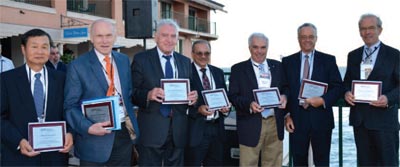
Attending IPITA founders were honored during the 25th Anniversary celebration;
(from left to right) Yohichi Yasunami, David E.R. Sutherland, Jean-Michel Dubernard,
Radolfo Alejandro, Raymond V. Rajotte, David W. Sharp and Reinout van Schlifgaarde
The setting of the Congress in Monterey was outstanding, and the Scientific Programme was well complemented by an excellent Social Programme. This included a DRWF Welcome Reception, a Beach Party Networking event for junior investigators, and the main Gala Event at the Monterey Aquarium.
We are very grateful to Peter Stock (Congress Chair), Andrew Posselt and Raja Kandaswamy (Joint Programme Chairs), the IPITA Council, and the TTS Office, for all their hard work in ensuring that this IPITA Congress was such a success. It marks an important landmark as we move IPITA into its' next 25 years.
 The 11th Congress of the International Hand and Composite Tissue Allotransplantation Society held in Wroclaw, Poland was a smashing success. It included an interesting scientific program, as well as a lovely social program such as the reception in the historic Wroclaw Town Hall and the gala dinner at the beautiful Wroclaw Opera House where Jean-Michel Dubernard and Raimund Margreiter were honoured as pioneers in CTA/VCA.
The 11th Congress of the International Hand and Composite Tissue Allotransplantation Society held in Wroclaw, Poland was a smashing success. It included an interesting scientific program, as well as a lovely social program such as the reception in the historic Wroclaw Town Hall and the gala dinner at the beautiful Wroclaw Opera House where Jean-Michel Dubernard and Raimund Margreiter were honoured as pioneers in CTA/VCA.
The scientific program included an update of the experience of the majority of centers performing hand or/and face transplantation over the world. In addition, uterus transplantation and abdominal wall allotransplantations were presented. There were sessions on donor issues and organization of hand or face transplantation program in different countries. In addition to the sessions focusing on rejection, infections and other complications in this new field of transplantation, the sessions on CTA/VCA models and potential new methods to treat rejection and speed nerve regeneration induced particularly productive discussions. During Melina Nakos’ Symposium, the participants debated with gusto on whether we are ready to offer CTA/VCA grafts to children and patients with congenital defects.
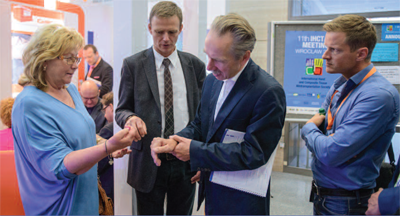
One of the three hand transplant recipients from the Wroclaw program
who attended the 11th IHCTAS Congress meets with
meeting attendees to discuss her experience.
There were three keynote lectures: Dr. Dubernard: “VCA: From Myth to Reality”; Dr. Margreiter: “How We Arrived at CTA: Recollections of an Old Transplant Surgeon” that led to the Innsbruck hand transplant program; and, Dr. Siemionow: “Ethical Aspects of Face Transplantation”. In addition, three of the hand transplant recipients from the Wroclaw program attended the meeting and discussed their experience with meeting participants.
Finally, a General Assembly of the members of IHCTAS was held and we are pleased to welcome the new members of our 2013–2015 Council. A complete list of the Council, as well as the goals of the Society can be found at www.ihctas.org.
Our profound thanks to Dr. Jablecki, the organizing and honorary committee, and TTS for a wonderful opportunity to share and obtain feedback in this exciting field.

Following recent meetings of the Council of the Cell Transplant Society, we are pleased to announce the development of several initiatives aimed at providing value and benefits to members of the Cell Transplant Society. A core initiative for the Society has been the development of three working committees, which are the Membership, Web and Social Media, and Young Investigator Committees.
The purpose of the Membership committee will be to review current activities, as well as develop other actvities for members outside of the biennial congress. The purpose of the Web and Social Media Committee will be to improve the content available on the members only section of the CTS website, as well as build a presence for the Society on sites such as LinkedIn, Facebook and Twitter. This will enable the Society to stay active in discussions related to the most recent and cutting-edge research related to cell transplantation. Lastly, a priority of CTS over the next two years will be interacting with and engaging the trainee members of the Society, as they will play a vital role in the future science of cell transplantation and cell therapies. The purpose of the Young Investigator Committee will be to engage our younger members and provide them with a voice on the future activities of the Society, as well as input on program development of future congresses.
Finally, in the coming months the Cell Transplant Society will invite institutions interested in hosting the 2017 meeting of the Cell Transplant Society to submit a formal bid to host the 14th Congress of CTS. Please check the website for more information on the call for bids at www.tts.org/cts.
The Women in Transplantation initiative of TTS has been very active this year, holding 11 networking events at international transplantation congresses in Australia, Austria, Canada, Japan, Poland, Qatar and the United States. From these events we’ve heard from a variety of women leaders, in different areas and specialties of transplantation. Through these networking events we’ve also had a chance to meet and hear from women in the field who are finding new ways to manage the challenges of their career and accomplish their goals. The most recent networking events during the International Pancreas and Islet Transplant Association meeting in California and the International Xenotransplantation Association meeting in Osaka, also shed light on the limited number of women participating in committees and Councils of our societies.
The Women in Transplantation initiative of TTS has been very active this year, holding 11 networking events at international transplantation congresses in Australia, Austria, Canada, Japan, Poland, Qatar and the United States. From these events we’ve heard from a variety of women leaders, in different areas and specialties of transplantation. Through these networking events we’ve also had a chance to meet and hear from women in the field who are finding new ways to manage the challenges of their career and accomplish their goals. The most recent networking events during the International Pancreas and Islet Transplant Association meeting in California and the International Xenotransplantation Association meeting in Osaka, also shed light on the limited number of women participating in committees and Councils of our societies.
To hear all of this year’s presenters and view their presentations, please visit www.tts-wit.org.
Feedback from these networking events, as well as several meetings of the WIT Steering Committee has lead to the development of a revised structure of the Committee to ensure more equal geographic representation of its members. In expanding the geographic representation of the Committee, there will be an increase in the number of Committee members, which in turn will allow for more women from different specialties to take part in the Committee’s work.
Finally, the committee’s goal over the next year will be to increase the initiative’s areas of focus to include: leadership training, recognition of achievement by women leaders, issues faced by female patients and a renewed focus on our mentorship program.
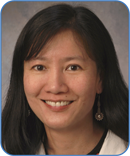
Anita Chong
Committee Chair
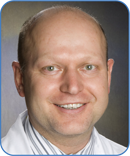
Stefan G. Tullius
Committee Co-Chair
The 13th Basic Science Symposium of TTS / 3rd Basic Science Meeting of ESOT that took place in Paris on November 7–9, 2013 was another exciting, educational and interactive meeting. More than 146 abstracts were received, a record number, and of those, 20 were selected for oral presentation.
The program, chaired by Maria Cristina Cuturi from Nantes, along with co-chairs, Marc Dahlke from Regensburg, Germany and Stefan G. Tullius, Boston, USA, combined a line-up of key opinion leaders in the field presenting the most relevant updates on all aspects of sciences in transplantation and neighboring basic and translational disciplines. More than 20 Mentor-Mentee travel awards were given to young, aspiring researchers and their mentors to promote their attendance to the meeting. The awards were sponsored by The Transplantation Society, in collaboration with the Canadian Society of Transplantation, the Société Francophone de Transplantation (France), the Deutsche Transplantationsgesellschaft (Germany), the Japan Society for Transplantation, and The Transplantation Society of Australia and New Zealand, as well as the International Liver Transplantation Society and the International Society of Heart and Lung Transplantation. This was a truly international, multi-organization effort, supporting the spirit of advancing transplantation sciences. We are extremely grateful to all cooperating societies.
We hope that you had a chance to attend this meeting and we are looking forward to give you a full review of the meeting in the next edition of the Tribune.
As a follow-up to the Young Investigator Awards that were presented at
the 24th International Congress in Berlin, the Tribune shines a spotlight
on the awardees in this the final installment of the three-part series.
Our congratulations once again.
The spotlight will return next year after the
2014 World Transplant Congress in San Francisco.
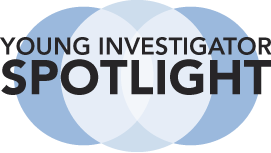
|
|
DR. MORITZ SCHMELZLE was granted a Young Investigator Award for his research paper entitled “Increased Plasma Levels of CD133+ Microparticles Bearing Ectonucleotidases are Noted in Acute Liver Failure in Patients and in Experimental Mouse Models”. The focus of Dr. Schmelzle`s studies lies on complex cellular interactions of bone marrow hematopoietic stem cells and primary liver cells, with the goal to effectively translate stem cell-based therapies into the clinic or mimic their functions pharmacologically. Special emphasis has recently being put on stem cell derived plasma microparticles as novel intercellular carriers. Dr. Schmelzle received his M.D. from the Technical University of Munich, Germany. After completing his postdoctoral fellowship under the supervision of Prof. Simon C. Robson at Harvard University, he currently works as a surgeon at the University Hospital Leipzig and leads his own research group at the Translational Centre for Regenerative Medicine at the University of Leipzig, Germany. |
|
|
DR. TINA SCHMIDT received a Young Investigator Award for her work on the comparative analysis of blood-based interferon γ release assays for detection of cellular immunity in samples from deceased organ donors. In collaboration with the “Deutsche Stiftung Organ transplantation (DSO)”, whole blood samples of deceased donors were collected and tested for CMV- and M. tuberculosis-specific T cells and for general immune reactivity using ELISA, ELISPOT and flow-cytometric assay formats. The results show that cellular immunity may be detected from samples of deceased donors although the three assays differ in their performance characteristics. This is the first study that has evaluated currently available experimental assays for assessing cellular immunity as evidence for prior contact with a pathogen in samples from deceased donors and may have important implications for improved donor-screening. The biologist got her PhD in systems biology of herpesviruses from the Medical Faculty of the Saarland University, Germany, and is now a postdoctoral fellow at its Department of Transplant and Infection Immunology. Under the mentorship of Prof. Dr. Martina Sester, who is involved in the characterisation of antigen-specific immune responses towards a variety of clinically relevant pathogens in immunocompromised patients. |
|
|
DR. ADNAN SHARIF received his Young Investigator Award for work performed with colleagues at the Incompatible Kidney Transplant Program at Johns Hopkins Hospital. His work identified several histopathologic phenotypes in HLA-incompatible kidney recipients that correlate with allograft outcomes. Characterization of these phenotypes is the first step towards better understanding the pathophysiologic basis of chronic antibody-mediated allograft injury and individualizing therapeutic intervention. Adnan completed this work during an International Visiting Fellowship to Johns Hopkins Hospital under the mentorship of Professor Robert Montgomery. Adnan currently works as a Transplant Nephrologist at the Queen Elizabeth Hospital in Birmingham, England. His current research interests include antibody-incompatible kidney transplantation, new-onset diabetes after transplantation, minority ethnic issues relating to organ donation/transplantation and epidemiological probes of transplantation registry data. |
|
|
DR. SIMO SYRJÄLÄ earned his MD from the University of Helsinki in 2011 and is currently working as a PhD student under supervision of Prof. Karl Lemström. His studies focus on the cardiac allograft ischemia-reperfusion injury (IRI), and the connection between the angiopoietin pathway and immune activation. Dr. Syrjälä received the Young Investigator Award in 2012 from his work entitled “Ang1 Reduces Ischemia-Reperfusion Injury–Induced Microvascular Dysfunction and Chronic Rejection in Rat Cardiac Allografts”. In 2012, he was also awarded with the Philip K. Caves Award from the ISHLT. Dr. Syrjälä and his colleagues showed that supplementing angiopoietin-1 (Ang1) into the coronary circulation of recovered rat cardiac allografts reduced myocardial injury and inflammation early after revascularization of the graft. Protecting the allograft from IRI also inhibited the development of chronic rejection changes. Dr. Syrjälä is currently exploring the therapeutic potential of targeting Ang1/Ang2-pathway in acute and chronic rejection in experimental rat cardiac transplantation model with future clinical applications in mind. |
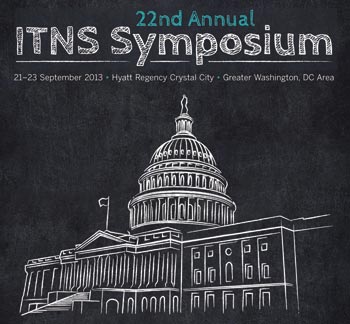 The International Transplant Nurses Society (ITNS) celebrated its 22nd Annual ITNS Symposium in Washington, DC, USA in September. The theme of the Symposium was “Live, Love and Lifelong Learning”, selected for the caring nature of transplant nurses and their thirst for knowledge.
The International Transplant Nurses Society (ITNS) celebrated its 22nd Annual ITNS Symposium in Washington, DC, USA in September. The theme of the Symposium was “Live, Love and Lifelong Learning”, selected for the caring nature of transplant nurses and their thirst for knowledge.
Dr. Francis L. Delmonico delivered the keynote address on "Organ Donation and Transplantation: the WHO/TTS Perspective". Dr. Delmonico gave an engaging presentation on the disparity between the need for organs and access to donations across nations. The nearly 300 transplant nurses in attendance benefitted from his worldwide perspective on transplant. The Society thanks Dr. Delmonico for sharing his expertise and his support of both transplant nurses and ITNS.
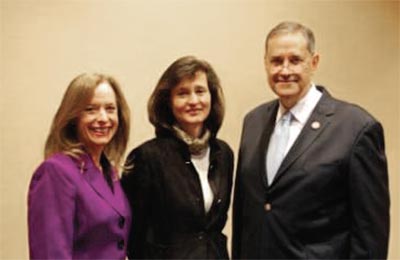
ITNS President Cindy Russell (left), ITNS President Emeritus Christiane Kugler,
TTS President Dr. Francis Delmonico at the ITNS Symposium, Washington D.C.
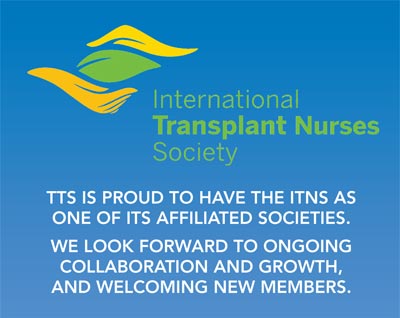
The Symposium opened with a flag ceremony in which international representatives walked their native flag to the stage. The camaraderie and collegiality of attendees from 13 countries was wonderful to see.
During the Membership Meeting Lunch, ITNS President Christiane Kugler provided attendees with an update on the business of the society over the past year. One of the major achievements highlighted during this session was ITNS’ Affiliate Membership with TTS. Christiane highlighted the benefits of joint membership in TTS and encouraged attendees to take advantage of the steeply discounted membership.
The Symposium attendees enjoyed numerous educational sessions, networked with colleagues, and shopped in the ITNS bookstore. The Monuments by Moonlight bus tour of the Washington, DC monuments was a major hit! Although it was a rainy night, it did not deter the nearly 150 ITNS tourists from jumping off the bus to view the monuments up close.
Three exciting days of learning at the Symposium concluded with a closing ceremony in which Christiane Kugler passed the gavel to Cynthia Russell for her 2013–2014 term as ITNS President.
ITNS hopes our friends at TTS will join us again next year from 27–29 September 2014 for the 23rd Annual ITNS Symposium in Houston, TX, USA.

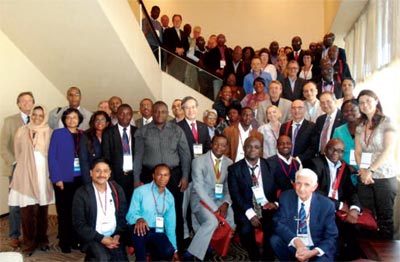 A workshop promoting organ donation and transplantation throughout Africa was conducted/and sponsored by The Transplantation Society through the Global Alliance for Transplantation (GAT) in August 2013 in Durban, South Africa.
A workshop promoting organ donation and transplantation throughout Africa was conducted/and sponsored by The Transplantation Society through the Global Alliance for Transplantation (GAT) in August 2013 in Durban, South Africa.
Stakeholders representing medical professionals, professional societies and the World Health Organization (WHO) were convened to address the development of organ donation and transplantation in Africa. Representatives from ten countries (Cameroon, Ethiopia, Ghana, Kenya, Malawi, Nigeria, Rwanda, Sudan, Tunisia and Zambia) reviewed local needs and then identified strategies for the immediate and longer-term development of donation and transplantation development in their country.
Each participating country reported on local dialysis and transplantation activity, known practices with respect to transplant tourism, local infrastructure to support transplantation (e.g. ICU beds, ICU physicians and nurses, facilities for donor management, compatibility testing and screening), financing of dialysis and transplantation, and the local legislative environment. With the exception of South Africa, there is virtually no deceased donation in Africa; and yet, the estimated burden of renal failure in Africa is staggering, potentially exceeding 300 new cases of renal failure per million adults annually due to hypertension alone. Moreover, continuing demographic, epidemiological and economic shifts will have implications for the future incidence of organ failure in the African region, and for the level of demand for high-level health care including transplantation.
We learned of countries with 6000 patients receiving dialysis in the public sector, but with transplantation activity of fewer than 200 kidney transplants in 2012. We learned of countries with waitlists exceeding 1500 patients but fewer than 20 transplants performed annually, and of patients departing Africa for India and other countries, financed by governments, because there is no local transplantation service competitive in resource availability. These observations require government/national health authority/ministerial attention and the conclusion of the workshop was to suggest that professionals must be aligned to target government to support transplantation services within the country - achieving a WHO direction of self-sufficiency.
On August 17–18, just prior to the 12th Banff Conference on Allograft Pathology, The Transplantation Society and leaders from the Latin American transplant community met in Comandatuba, Bahia, Brazil for the annual KOL-nKOL Meeting. The Meeting was designed to show the on-going work in transplant immunology and pathology in Latin America.
Four main sessions were moderated by very distinguished guests who provided four state-of-the-art lectures:
- Guidelines for HLA antibody testing was reviewed by Gerhard Opelz;
- What makes an antibody harmful? was analyzed by Adriana Zeevi;
- What to do with vascular lesions? was discussed by Denis Glotz; and,
- The role of complement in antibody-mediated rejection was evaluated by Robert Colvin.
Invitations were sent to many Latin American transplant physicians and scientists. Argentina, Brazil, Chile, Colombia and Mexico sent twenty abstracts that were presented by the nKOLs and deeply discussed by distinguished guests with their respective KOLs.
In the immunology sessions, the main subjects were the relevance of adipokines, soluble CD30 levels, the C1q-fixing properties and ig subclasses of the anti-HLA antibodies, the role of the HLA-g genotypes and serum levels. Also, the impact of antibody-mediated rejection in kidney and heart transplantation and the utility of the dsa monitoring to preview function and survival, to define immunosuppression and to follow desensitization procedures were analyzed.
At the immunopathology session, tissue staining for Foxp3, IL-17, CD68 in kidney and heart biopsies were evaluated. At the pathology session, the impact of pre-implantation biopsies, C4d staining, lymphoangiogenesis, protocol biopsies in sensitized patients were the main subjects. Comparisons were made between histological findings in biopsies performed in simultaneous kidney-pancreas transplants. Also, microarray analysis was compared to the classical Banff triad of histology/C4d positivity/DSA presence.
The symposium was very successful in bringing young investigators and local transplant pathologists to show their work and to participate on the 12th Banff Conference, and in promoting the interaction and cooperation between Latin American and international centers.
|
Invited Guests: |
TTS Key Opinion Leaders (KOLs): |
TTS New Key Opinion Leaders: |
|
Robert B. Colvin (USA) |
Estela Azeka (Brazil) |
Nestor F. Pedraza Alonso (Colombia) |
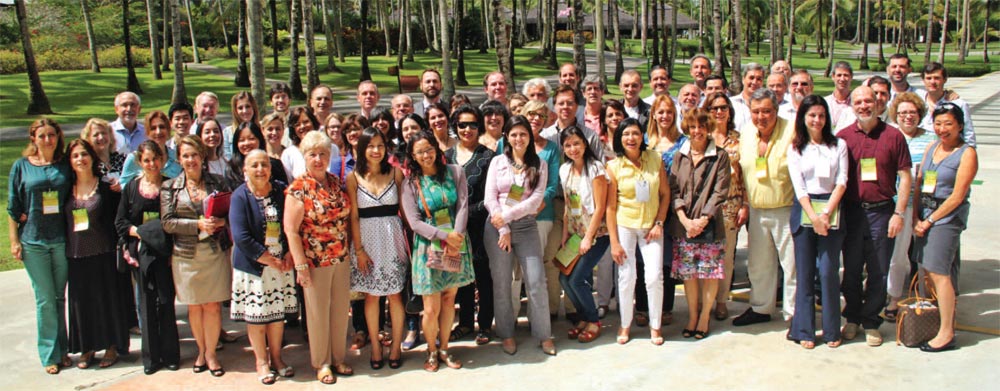
In 2014, three Officer positions will be vacated and 6 of the 12 councilors-at-large representing the regions will be changing. The elections will take place early in 2014 and those elected will assume their new roles following the 2014 World Transplant Congress in San Francisco.
Nominations are being sought for these positions. Members can access the online nominating form at www.tts.org/nominations. Since each nominee must have his or her form signed by three supporting members (including him/herself), the online process allows for efficient and rapid circulation.
Please note: Only full members who have paid their dues may nominate and/or vote.
For more information on elections, visit the TTS website (www.tts.org) and consult the by-laws in the “About” section.
The Officer positions are:
- President-Elect
- Vice-President
- Treasurer
TTS Regions are:
- Asia
- Europe
- Latin America
- Middle East / Africa
- North America
- Oceania
The Transplantation Society Biennial Council Retreat Was Held This Year in Florence, Italy from June 28-30
The meeting was chaired by the current TTS President, Frank Delmonico, and was attended by council members, Presidents of TTS sections, committee chairs and guests. The meeting opened with a moment of silence and expressions of appreciation for contributions of the late Henrik Ekberg. This was followed by a motion supporting the appointment of Phillip O’Connell to President-Elect which was passed unanimously. A finance and membership report (TTS now has over 6000 members) served to confirm optimistic predictions for TTS organizational strength. Reports of the TTS sub-committees provided an overview of TTS activities, in particular the future relationship between TTS and the journal Transplantation and the newly developed capacity of the Montreal TTS office to manage conference arrangements independently. Cooperation with the ISN in the Global Outreach (GO) project was noted and encouraged. The academic and financial outcome of the recent TTS Berlin meeting and predictions for upcoming meetings in 2014, 2016, and 2018 were presented. Reports of TTS subsection activities were provided together with a summary of the outcome of the meeting to celebrate the 5th Anniversary of the Declaration of Istanbul, held in Doha, Qatar in April 2013
Luc Noel, representing WHO, provided an update on international transplant data and a review of the status of the “self-sufficiency” paradigm. Dr. Noel will be retiring from his post in 2014 and the council expressed deep appreciation of his untiring work to promote the mutual aims of TTS and WHO. Regional representatives presented updates on local developments; success in promotion of transplantation in South Eastern Europe was greeted enthusiastically. The topic of TTS interaction with China was addressed repeatedly. The TTS policy relating to the unacceptability of ‘donation’ from executed prisoners was re-emphasized, irrespective of “consent”. Note was made of positive developments in China and efforts of those who are promoting both deceased and living donation according to international standards. There was consensus that selective engagement of TTS with those individuals and government agencies committed to put an end the use of organs from executed prisoners was to be encouraged, and that TTS representatives could engage directly with Chinese transplant programs and institutions after having determined that they had stopped the practice.
Break-out sessions of the retreat addressed the future direction of the Society. Much emphasis was placed on strengthening its role in research and education, and maintaining its international “brand” as a force for the promotion of living and deceased transplantation according to the highest medical and ethical standards.
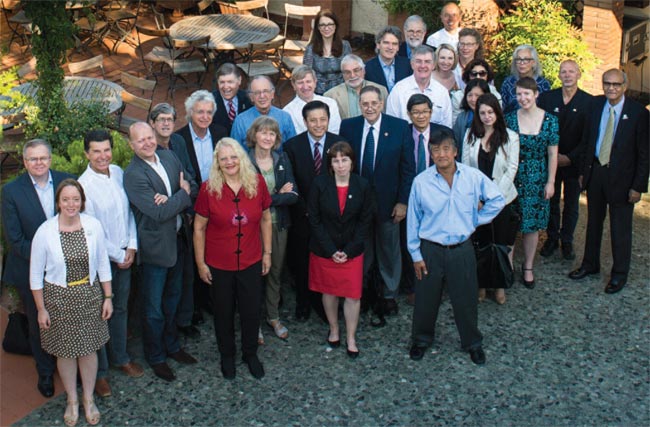
The Relationship of TTS with Developments in China
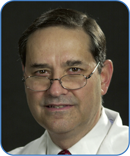
Francis L. Delmonico
TTS President
There are new developments indicative of the resolve of China to change its long-standing practice to use organs from executed prisoners.
I recently visited with Deputy Director Zhou Jun of the National Health and Family Planning Commission (NHFPC) in Beijing on August 15, 2013, who presented the goals of the NHFPC (China’s Ministry of Health) set forth by the new Minister of Health Bin Li.
The regulations from NHFPC (and now displayed on its website) include the following seminal stipulations:
- the mandatory use of a computer system for the allocation of organs;
- the defined responsibility and geographical service area for the organ procurement organization (OPO);
- the defined qualifications, responsibility and accreditation of the organ donation coordinator.
These goals were brought forward at the 2nd OPO training course just held in Beijing, in which The Transplantation Society participated. The infrastructure of the OPO as defined by the NHFPC regulations will require training and education of professionals. Again, TTS seeks to be of assistance in these training exercises and it will seek the involvement of the WHO and other international organizations and professional societies to join in that effort of training of OPO coordinators and the development of OPO systems throughout the country.
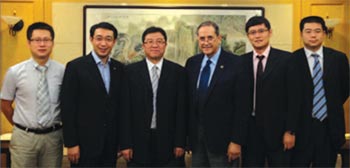
(from left to right) Drs. Zhao Jie, Haibo Wang (DICG leader),
Director Zhou Jun, TTS President Francis Delmonico, Liu Yong and
Du Bing at the NHFPC, August 15, 2013.
At the recent August meeting in Beijing, Dr. Huang Jiefu brought to attention that the Hangzhou Resolution will be announced by the OTC in Hangzhou in November, 2013 “to address that the source of the organs for transplantation must meet the commonly accepted ethical standards in the world, (and that) policies on national organ donation and allocation must be followed and the principle of fairness, justice and transparency of organ transplantation must be upheld”. TTS will participate in that Hangzhou meeting and support those goals - all consistent with WHO and TTS principles.
Transplant centers in China must now develop (mandatorily) a service of organ donation and transplantation consistent with the new national program just reported in the official journal of TTS, Transplantation: The National Program for Deceased Organ Donation in China. Huang J, et al Transplantation. 2013 Jul 15; 96 : 5-9.
TTS has also made clear that it will not engage itself with centers or professionals that are not committed to develop the new program. TTS chooses to work towards that new program because of its (TTS) sustained commitment to oppose the use of organs from executed prisoners; but it now does so with a leadership of China that can make that change.

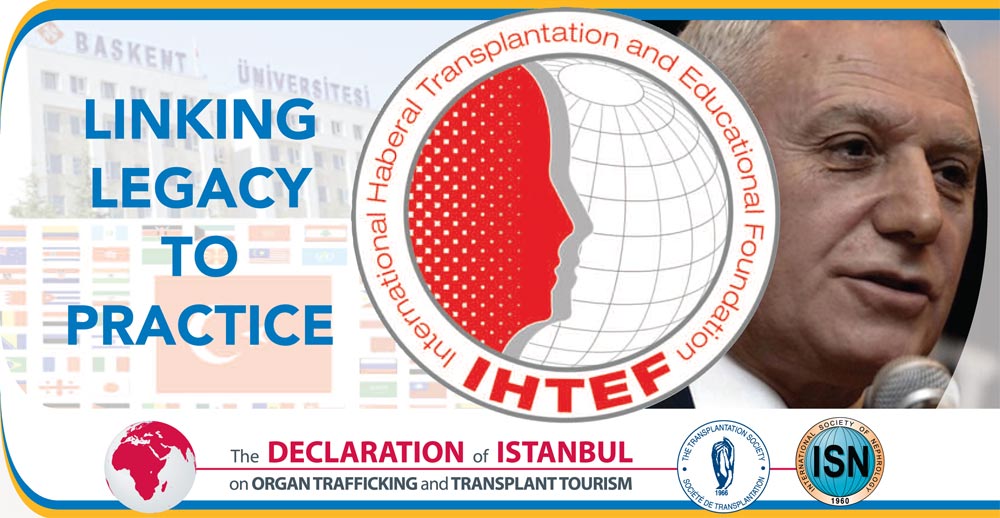
The Transplantation Society is pleased to announce the establishment of The International Haberal Transplantation and Education Foundation (IHTEF) to support the work of the Declaration of Istanbul
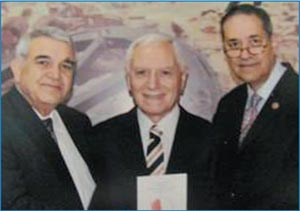
July 20, 2013, Silivri prison outside Istanbul:
Professor Mehmet Haberal (middle), Founder of IHTEF,
seen holding the IHTEF brochure; with TTS President
Francis L. Delmonico and Feyyaz Artukoglu (left),
representing Dr. Haberal at the 5th Anniversary Meeting
of the Declaration of Istanbul in Doha, Qatar and key
delegate of the Foundation who will work directly with DICG.
Professor Mehmet Haberal is an internationally renowned transplant surgeon who pioneered kidney and liver transplantation in Turkey. He is the Founder and President of the Turkish Transplantation Society (TOND) and Founder and first President of the Middle East Society for Organ Transplantation (MESOT). He served as Councilor of The Transplantation Society (TTS) representing the Middle East and Africa for the term 2004-2008 and as President of the International Society for Burn Injuries (ISBI) for the term 2006-2008. He is also the Founder and President of Baskent University in Ankara, Turkey, which has established 10 hospitals and 14 dialysis centers throughout the country. In the general election held on June 12, 2011, Professor Haberal was elected a Member of Parliament from the province of Zonguldak on behalf of the People’s Republican Party (CHP).
Through the creation of the International Haberal Transplantation and Education Foundation, The Declaration of Istanbul Custodian Group (DICG) seeks to link indelibly the legacy of Professor Haberal's contributions to the field of transplantation and his steadfast devotion to developing ethically proper practices of deceased and living organ donation around the world.
Mission of IHTEF for the Declaration of Istanbul:
to Dr. Haberal in his restored freedom
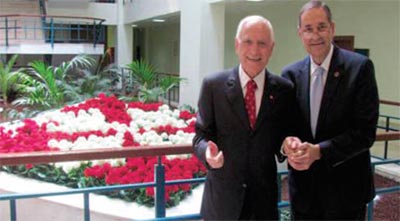
Dr. Haberal having been released from the Silivri prison on August 5th 2013
and now in the corridors of his beloved Baskent University.
The mission of the IHTEF is to collaborate with the Declaration of Istanbul Custodian Group in promoting, sustaining and monitoring the implementation of the Declaration of Istanbul worldwide. IHTEF and DoI will foster systems of living and deceased organ donation free of coercion, exploitation, commercialism or human trafficking and to help countries develop means to achieve self-sufficiency in organ donation and transplantation.
Henceforth, as the history of organ transplantation is written, the name of Professor Mehmet Haberal will be enduringly associated with the Declaration of Istanbul.
Contact
Address
The Transplantation Society
International Headquarters
740 Notre-Dame Ouest
Suite 1245
Montréal, QC, H3C 3X6
Canada
Используйте Вавада казино для игры с бонусом — активируйте промокод и начните выигрывать уже сегодня!

